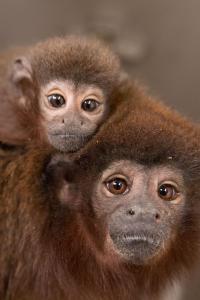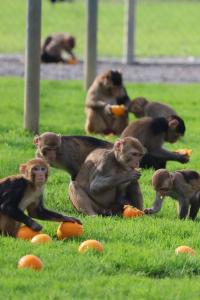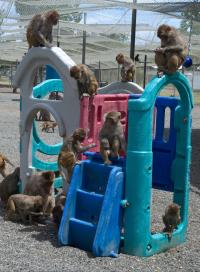Animal Care
A large staff of veterinarians, veterinary residents, and animal health technicians care for the Center's monkeys as well as provide research support. The animal care staff – about 100 individuals – feeds the animals, keeps their housing areas clean, monitors them daily, and works to promote the well-being of the animals in their care.
Daily Care
Animal care staff, veterinarians, and support staff are on-site at the Center 24 hours a day, 7 days a week, year-round. Our outdoors and animal care staff feed the monkeys twice a day with a nutritionally complete diet of Purina Monkey Chow ("monkey biscuits") and clean the outdoor corral substrates, climbing structures, and A-frame houses on a regular basis. They conduct twice-daily health checks during which the monkeys are trained to move around the perimeter of the corral in order to give staff an opportunity to visualize each animal and be alert for those who might need some additional attention. Staff are familiar with each animal's history, personality, and relationship with other animals and are able to recognize immediately if an animal requires a visit to the CNPRC veterinarians. Indoor-housed animals are also fed monkey chow and fresh fruits and vegetables, in addition to enrichment foods (see Enrichment, to right). They are housed in enclosures that allow them to spend the daytime hours with another animal – either male or female pairs, or male/female pairs and offspring. Animals are housed separately at night when fewer staff members are available to monitor interactions.

Birthing Season
From late January through June is birthing season at the CNPRC. Rhesus females live with their older offspring and other relatives in the field corrals and give birth unassisted, usually during early morning hours. Animal care staff keep a close watch on all of the animals at all times and take special care during the birthing season to note births, ensure sufficient milk production and infant handling skills, and provide assistance when necessary for the health of the infants and dams.
Animal Care Staff
Animal care personnel make a long-term commitment to ongoing education and are trained in the latest techniques in laboratory animal care and well-being. Over 95% of our animal care staff have advanced training in animal care techniques and are educated in behavior and enrichment and other topics to enhance their understanding of the animals' health and well-being. CNPRC Core Scientists provide staff seminars where staff learn how their efforts contribute to the success of the research. Over half of the animal care staff have taken advantage of an established, in-house training program that provides the opportunity to advance knowledge and careers, such as Assistant Laboratory Animal Technicians receiving certification as a Laboratory Animal Technician (LAT).
Physical, Social and Behavioral Enrichment
The CNPRC has a model environmental enrichment program for the benefit of all animals, indoors and outdoors. The goal is to provide daily enrichment and to facilitate psychological well-being through the provision of multiple forms of environmental enrichment.

Fresh Fruits and Vegetables
In addition to a nutritionally complete diet of monkey chow, seasonal produce is provided to all of the animals on a once- to twice-weekly basis. This produce provides additional variation to the diet and also enriches the animals' natural behaviors of foraging and processing food items. These include broccoli, which is eaten stem first, cherry tomatoes, sliced apples, carrots, sunflower seeds, and oats, which are picked from the grass and stored in cheek pouches. Halloween pumpkins are donated yearly by a local farmer, and pumpkins are enjoyed both as climbing toys and snacks.
Climbing Structures and Playground Equipment

Field corrals contain climbing structures, playhouses, slides, barrels, tree trunks, and unique enrichment structures built by the CNPRC staff. These all provide safe ways to allow the monkeys to participate in normal behaviors and also enrich their environment.
Indoor Enrichment
For indoor animals, daily socialization is achieved by careful pairings, and monkeys are provided with puzzle feeders, fresh produce, "reality" TV (video of wild and outdoor housed monkeys), mirrors, and treat foods.
